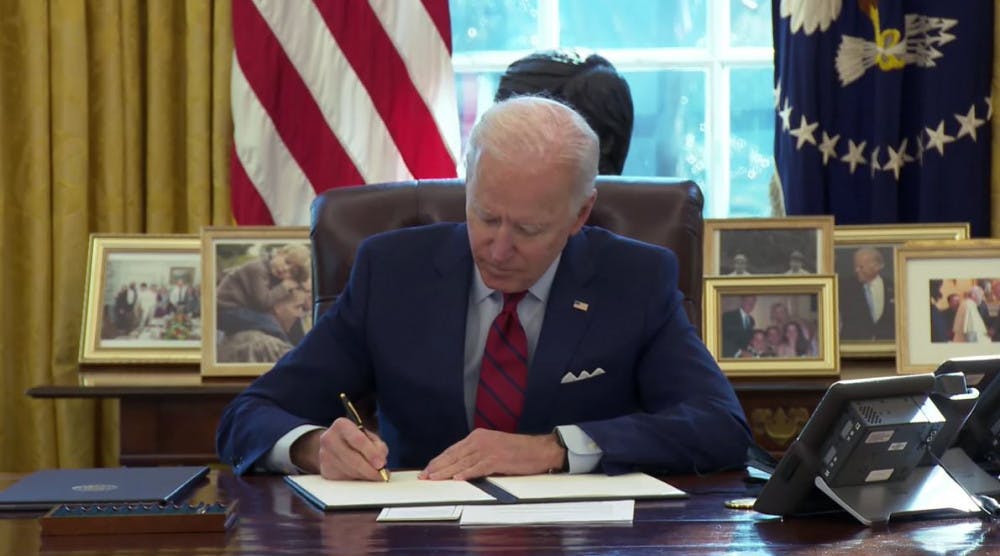President Joe Biden has signed 28 executive orders within his first two weeks as president — more than most presidents in recent history have done in their first month in the Oval Office. On the cusp of Black History Month, Biden issued several orders related to ending racial inequity and discrimination.
The president has moved to not renew federal contracts with private prisons, as well as to direct the Department of Housing and Urban Development to comply more closely with the Fair Housing Act — moves that many have deemed important in the fight against racial inequity.
But despite the intent of Biden’s executive orders, some University scholars and activists believe that they only scratch the surface of what is needed to achieve racial justice.
“The executive order that was signed by Biden, of course, it's a step in the right direction,” said Professor of Sociology Nicole Gonzalez Van Cleve, whose work centers on criminal justice and its relation to racism. But “targeting for-profit prisons is not going to do very much. It really is a drop in the proverbial bucket.”
Gonzalez Van Cleve said that ending contracts with private prisons will not end the profitization of the carceral state, calling Biden’s executive order “a largely symbolic move.”
“Just because something is not-for-profit doesn't mean that there isn’t economic interest in state prisons and state jails to continue to incarcerate people,” Gonzalez Van Cleve said, “despite the general momentum of people wanting to scale back.”
The executive order applies to only 1.5 percent of the U.S. prison population, according to The Washington Post. Many have also noted the order does not apply to the Department of Homeland Security, which encompasses private immigration facilities run by Immigration and Customs Enforcement.
Assistant Professor of Education Jonathan Collins described Biden’s executive order on private prisons as doing “very little to reduce mass incarceration” in the larger scheme. “From a practical perspective, less than 10 percent of state and federal prisoners are kept in private prisons,” he wrote in an email to The Herald. “The vast majority are kept in state-run facilities.”
Collins also noted police misconduct and treatment of those incarcerated as another issue necessary to address in Biden’s racial equity plan.
“We call it a corrections system, but it's a system that in itself needs lots of correction,” Collins wrote. “We need more preventative measures to ward against things like wrongful convictions and unfair sentencing. We need tighter protections against racial bias in policing, prosecution and sentencing.”
The effort exemplified by the executive orders “does include having to shift responsibility onto officers and sheriffs that maintain these prisons,” Gonzalez Van Cleve said. “It's going to take a continued movement to continue holding the administration accountable.”
Biden’s racial equity agenda also addressed housing reform in an executive order. According to the order, HUD is to reassess former President Donald Trump’s August 2020 memorandum that repealed an Obama-era housing protection ruling, which focused on the protection of housing rights and repealing racial discrimination practices in federal housing.
Gabe Mernoff ’22.5, an advocacy team member of Housing Opportunities for People Everywhere, which aims to address structural issues surrounding homelessness, said he is “happy” with the ruling but sees it as “very limited in its scope.”
The executive order is “only talking about units that the federal government has jurisdiction over, which is not even all public housing units, let alone the whole private market,” Mernoff said. “So there's a lot of renters this doesn't reach, and so we also need strong state and local laws.”
Mernoff added that housing discrimination based on source of income needs to be addressed on the private level. He said that through HOPE, he has witnessed people seeking housing being turned away when trying to use Section 8 Housing Choice vouchers, which are meant to assist low-income families in the private market. He said the reason for this is often because those seeking to rent are low income, Black or Hispanic.
Mernoff commented on the ways in which homelessness relates to racial inequity, saying that based on surveys conducted with communities of color, there are statistical representations of racial exclusion in housing, as well as in other areas such as public transit.
While the executive orders are “overall a step in the right” direction, Mernoff said he hopes that issues of housing and racial inequity remain priorities in the Biden administration.

ADVERTISEMENT




